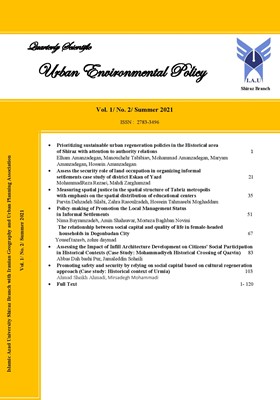Assess the security role of land occupation in organizing informal settlements case study of district Eskan of Yazd
Subject Areas : Urban planningmohammadreza Rezaei 1 * , mahdi Zargham 2
1 - Associate Professor Geography and Urban Planning, Yazd University, Yazd, Iran
2 - M.A in Geography and Urban Planning, Yazd University, Yazd
Keywords: housing quality, Informal housing, land occupation security,
Abstract :
Security and a sense of security in the possession of housing is an important and effective social and psychological dimension of housing; Because it makes households feel safe in terms of their housing prospects. On the other hand, for low-income groups to improve their housing over time, the security of the right of possession is very important. In recent years, the security of land occupation as one of the basic rights of households has attracted the attention of many international organizations and has led to the creation of new studies and currents of thought in the field of improving the security of occupation. In most of these studies, improving land security has been considered necessary to improve the living conditions of households. The purpose of this study is to investigate the role of land occupation security in organizing informal settlements in Yazd neighborhood and since achieving physical-spatial organization of informal settlements is not separate from physical, social and managerial issues, in this study Occupational security and variables of housing quality and managerial and service factors were considered in the mentioned projects. The present research is descriptive-analytical. Cochran's method is used to determine the statistical sample size and the sampling method is prepared based on a questionnaire and the relevant questions are completed by the head of households living in the neighborhood in a simple random method and finally the collected information is tabulated. Frequency distributions and graphs are analyzed and then the relationships between variables are analyzed using Cronbach's alpha methods, Tau-Kendall correlation coefficient and multiple regression in SPSS software package. of services.Extended Abstract: Introduction:Security and a sense of security in the possession of housing is an important and effective social and psychological dimension of housing; Because it makes households feel safe in terms of their housing prospects. On the other hand, in order for low-income groups to improve their housing over time, the security of the right of possession is very important. In recent years, the security of land Possession as one of the basic rights of households has attracted the attention of many international organizations and has led to the creation of new studies and currents of thought in the field of improving the security of Possession. In most of these studies, improving land security has been considered necessary to improve the living conditions of households. The prevailing views on securing the right of possession in informal settlements believe that securing the right of possession is one of the basic requirements in legalizing informal settlements in countries. These views believe that the lack of security in Possession human settlements is the basis for other deprivations for the residents of these settlements. Research in this field has concluded that securing the right of possession (increasing the security of possession) in informal settlements improves the economic, social, physical, political and environmental conditions of these settlements. A review of the ruling literature on securing their right of possession showed that the security of possession has three dimensions: legal, perceptual and customary, and ignoring each of these dimensions and overemphasizing one dimension will reduce the results of executive policies.Methodology:The present research is descriptive-analytical. Cochran's method is used to determine the statistical sample size and the sampling method is prepared based on a questionnaire and the relevant questions are completed by the head of households living in the neighborhood in a simple random method and finally the collected information is in the form of frequency distribution tables and The graphs are analyzed and then the relationships between the variables are analyzed using Cronbach's alpha methods, Tau-Kendall correlation coefficient and multiple regression in SPSS software package.Discussion and findings:The present study examines the role of land Possession Security from three dimensions: legal (security that is created through legal tools and systems), perceptual (the amount of security that households feel and understand from their occupation position) and customary (the amount of security due to other factors Legal / extra-legal issues such as settlement size, duration of residence, solidarity of social organizations in the neighborhood and political support, etc.) in organizing informal settlements in Yazd neighborhood and since achieving physical-spatial organization of informal settlements, apart from issues It is not physical, social and managerial. In this study, the relationship between Possession Security and the variables of housing quality and managerial and service factors in the mentioned projects was considered.Conclusion:Since the main purpose of the study was to investigate the role of Possession Security in organizing informal settlements, first the relationship between the dimensions of Possession Security (legal, customary and perceptual) and then its extent and relationship with the research hypotheses (quality of housing and management and services) The research shows that the findings indicate that there is a direct relationship between housing quality and land Possession Security in the neighborhood and also there is a significant and positive relationship between management and service variables with Possession Security , ie with increasing service and Better management also increases the security of respondents..
_||_

